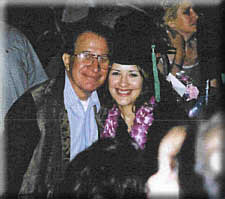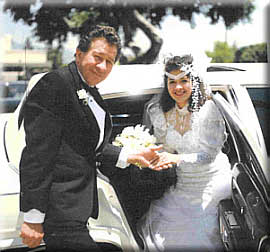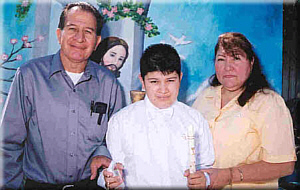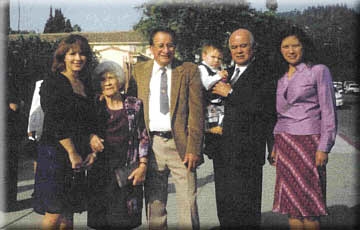Mesothelioma Shatters American Dream
Eduardo Sanchez was born and raised in Guatemala. In 1963, he moved to the United States in search of a better life. He found steady work in the Los Angeles area as a laborer and automobile mechanic. He married and started a family. In 1982, he proudly became a United States citizen. Eduardo Sanchez had indeed found a better life, until the summer of 2002, when his American Dream turned into an American Nightmare.
That summer, Eduardo developed a dry, hacking cough he could not shake. He also began feeling unusually fatigued. He went to a neighborhood clinic where several tests were performed. A chest film was not taken. After the doctors reviewed the results of the tests, Eduardo was informed that he might possibly be suffering from asthma. He was prescribed medication and sent home.
By August, Eduardo had lost nearly 20 pounds. His symptoms had not improved. He traveled to the Martin Luther King Hospital in Los Angeles. He was given a tuberculosis skin test which resulted in a positive reading and prompted the ordering of a chest film and later a CT and PET scans. The images revealed extensive pleural thickening as well as a pleural effusion in the left thoracic cavity.
On October 1, 2002, Eduardo was admitted to the Martin Luther King Hospital where he underwent a lung tissue biopsy. In a nearby hospital, his daughter Ivonne was giving birth to his first grandchild.
On October 8, Eduardo and Ivonne were informed by the thoracic surgeon that the tests performed on the removed tissue revealed a diagnosis of malignant mesothelioma. The doctor explained to him that there is no cure

They were referred to the oncology department at the City of Hope Hospital in Los Angeles. The oncologists reviewed Eduardo's medical records and informed him of the various treatment options available, including radiation and chemotherapy. The doctors also discussed surgical resection, including an extra-pleural pneumonectomy or pleurectomy with decortication. After careful consideration he decided on surgery. He and Ivonne then began to research possible surgeons.
They learned of the UCLA Medical Center's Dr. Robert Cameron -- one of the foremost treaters of mesothelioma in the world. Dr. Cameron explained to them in detail what a pleurectomy / decortication entailed. Before he could recommend that surgery, he advised Eduardo to undergo several tests for the purpose of determining if there was any lymph node involvement. In December, Eduardo underwent an exploratory mediastinoscopy procedure at UCLA.
The results of the mediastinoscopy showed that there was a tumor nodule inside the right lung parenchyma (tissue). Dr. Cameron informed Eduardo that because the lymph nodes were positive for cancer, he was unable to recommend surgery. He then discussed using Alimta on a compassionate use basis in hopes that the tumors, over time, would shrink enough in size to be surgically excised.
Eduardo once again found himself searching for a physician, this time for one able to administer the Alimta. Despite their efforts, the Sanchez family hit a brick wall. For starters, Eduardo's insurance was limited and several of the local physicians already enrolled in the Alimta expanded access program were not accepting new patients. Or, the physicians were so busy that Eduardo would have to wait weeks just to be seen. Eduardo and Ivonne also spoke with some physicians that were not willing to put their staff through the time-consuming procedure of applying for inclusion in the Expanded Access program.

The Sanchez family did not give up.
In mid-January, with the assistance of the staff at the Eli Lilly Expanded Access program, Ivonne was able to locate a physician willing to help her father. Eduardo received his first dose of Alimta on January 23, 2003. The side-effects of the first treatment were "unbearable," according to Eduardo. He was up every morning at 2 a.m. with severe stomach cramps and nausea. According to Ivonne, the second treatment was not as bad and Eduardo was thrilled not to get as sick as he did with the first treatment.
Eduardo has just completed his fourth treatment with Alimta. The latest CT-scan reveals there has been some shrinkage in the tumor. Finally! Some good news.
Since beginning his chemotherapy, Eduardo had lost his desire to eat. His body weight has withered away to a mere 124 pounds. Since hearing the results of the latest CT scan, he has renewed his fight and is beginning to eat more and gain some strength. He is forcing himself to eat soups and drink at least two nutritional liquid supplements a day.
Eduardo also must now fight the added stress stemming from his fears about what is to become of his family. He worries about his wife Maria, who has always been a stay-at-home mom. He married Maria in 1985. Maria does not know how to drive and her English is very limited. She depends heavily on Eduardo for many things. They have a 12-year old son who needs a strong paternal presence in the home.

Eduardo had planned to spend his time focusing all his attention on his son, guiding him through the perils found on the streets of Los Angeles. He was once able to walk his son to karate lessons or to the park where they would play. Unfortunately, now he cannot walk down the block without gasping for air. He is also worried about his new grandson. He wonders if he will ever get a chance to see him take his first steps, hear him speak for the first time, or take him to the park and play.
Ivonne is saddened by what has become of her father. "He used to love to read, and now he has lost all interest. He won't even read the newspaper anymore." He can no longer do the things he once enjoyed, like playing bingo, or driving to Las Vegas and Mexico. Thoughts about a trip to Florida the family had planned for this coming summer have been replaced by hopes that the Alimta treatments continue to work, that the tumors will shrink, that Dr. Cameron can perform surgery as desired and that Eduardo's life can be extended.
We will keep you posted on the progress of this persevering man and his family.
*** POSTED MAY 6, 2003 ***
Mr. Sanchez passed away on August 22, 2003

